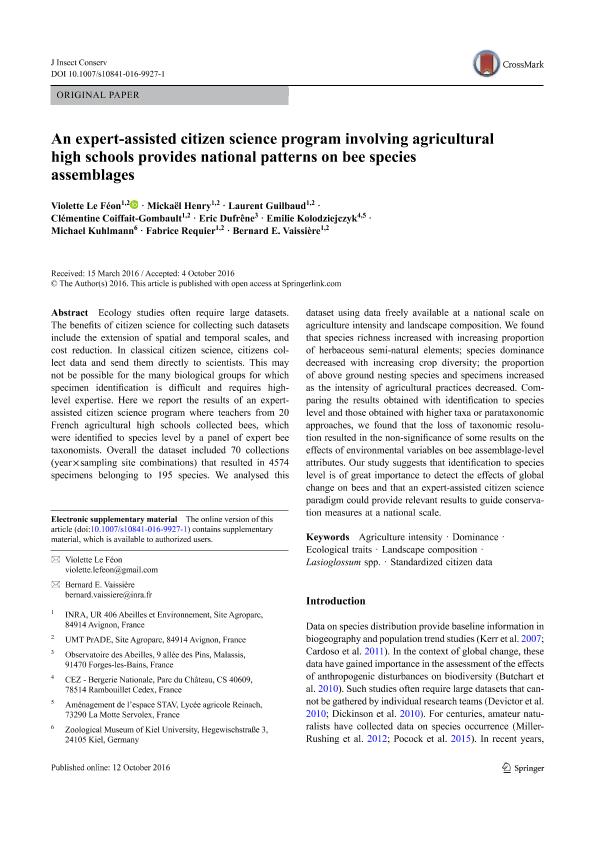Artículo
An expert-assisted citizen science program involving agricultural high schools provides national patterns on bee species assemblages
Le Féon, Violette; Henry, Mickaël; Guilbaud, Laurent; Coiffait Gombault, Clémentine; Dufrêne, Eric; Kolodziejczyk, Emilie; Kuhkmann, Michael; Requier, Fabrice ; Vaissière, Bernard E.
; Vaissière, Bernard E.
 ; Vaissière, Bernard E.
; Vaissière, Bernard E.
Fecha de publicación:
12/10/2016
Editorial:
Springer
Revista:
Journal of Insect Conservation
ISSN:
1366-638X
Idioma:
Inglés
Tipo de recurso:
Artículo publicado
Clasificación temática:
Resumen
Ecology studies often require large datasets. The benefits of citizen science for collecting such datasets include the extension of spatial and temporal scales, and cost reduction. In classical citizen science, citizens collect data and send them directly to scientists. This may not be possible for the many biological groups for which specimen identification is difficult and requires high-level expertise. Here we report the results of an expert-assisted citizen science program where teachers from 20 French agricultural high schools collected bees, which were identified to species level by a panel of expert bee taxonomists. Overall the dataset included 70 collections (year × sampling site combinations) that resulted in 4574 specimens belonging to 195 species. We analysed this dataset using data freely available at a national scale on agriculture intensity and landscape composition. We found that species richness increased with increasing proportion of herbaceous semi-natural elements; species dominance decreased with increasing crop diversity; the proportion of above ground nesting species and specimens increased as the intensity of agricultural practices decreased. Comparing the results obtained with identification to species level and those obtained with higher taxa or parataxonomic approaches, we found that the loss of taxonomic resolution resulted in the non-significance of some results on the effects of environmental variables on bee assemblage-level attributes. Our study suggests that identification to species level is of great importance to detect the effects of global change on bees and that an expert-assisted citizen science paradigm could provide relevant results to guide conservation measures at a national scale.
Archivos asociados
Licencia
Identificadores
Colecciones
Articulos(CCT - PATAGONIA NORTE)
Articulos de CTRO.CIENTIFICO TECNOL.CONICET - PATAGONIA NORTE
Articulos de CTRO.CIENTIFICO TECNOL.CONICET - PATAGONIA NORTE
Citación
Le Féon, Violette; Henry, Mickaël; Guilbaud, Laurent; Coiffait Gombault, Clémentine; Dufrêne, Eric; et al.; An expert-assisted citizen science program involving agricultural high schools provides national patterns on bee species assemblages; Springer; Journal of Insect Conservation; 20; 5; 12-10-2016; 905-918
Compartir
Altmétricas



